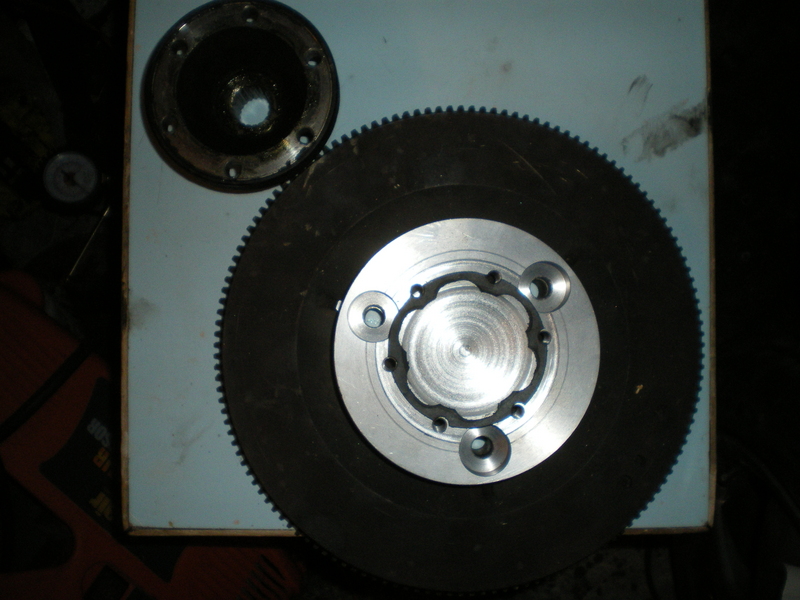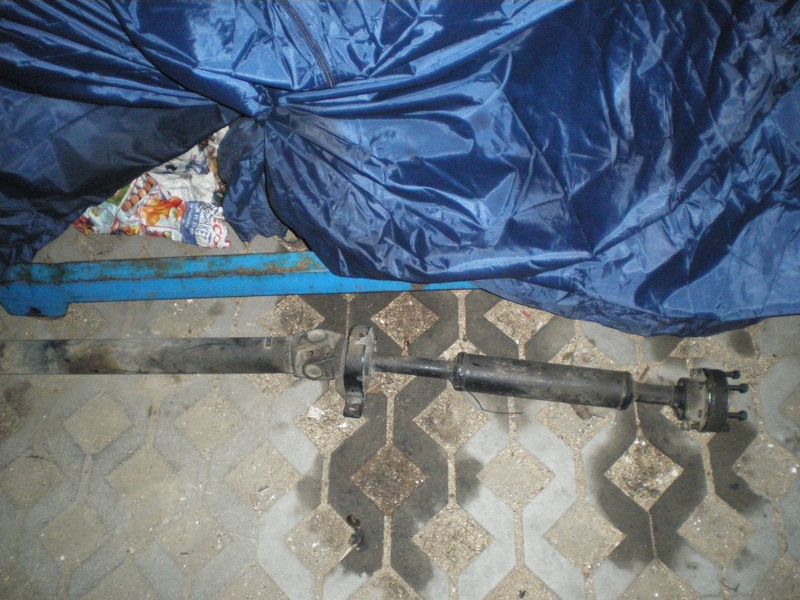Page 16 of 26
Re: driveshaft conversion
Posted: Sat Feb 27, 2010 5:01 am
by kterkkila
Mats and Mike, I think you both got good points to think about. Not saying that one is right or wrong, but it's good to hear about experiences. Anyway I will use CV's and flex discs, but not any UJ's. I don't like the idea of torsional vibration generated by them when there is some angle, and some angle is needed anyway to keep UJ live. But that's also only my personal thinking, not saying that UJ's aren't do their job fine. I still have some time to think about drive shaft couplings.
Sure Volvo parts are easily available here in Finland too. We have always had plenty of Volvos and Saabs on our roads. I already bought standard V6 engine mounts. The side mounts are relative firm, and additional reaction bar to head is also possible. The rear mounting has holes making it soft on up and down direction. In our endurance TS racer we filled those with sikaflex, and it does it's job well. But in the case of V6, such a reinforcing transfers the up and down hits to body, and it feels like great imbalance on drive shaft. It doesn't feel good at all. I tried to balance shaft installed on the car, but without success. I had to remove those added rubbers from the rear mount, and then it was good again.
On endurance I do have single 7.25" solid clutch disc (as shown on other topics) and I'm happy with it. It doesn't like slipping much, thus I don't like idea of drive with it in traffic. On race use it does really well. But in this case with V6 I probably go on twin organic discs with same 7.25" diameter.
Re: driveshaft conversion
Posted: Sun Feb 28, 2010 1:06 pm
by MD
Mats,
Enjoyed your last post. Very constuctive. While I was reading it, and idea came to mind that could see our respective approaches actually come together in a very slick way.
Using your version of CV's will give good results in terms of toughness etc which is what we all want.
The only modification I would suggest is one to keep the noise out and that could be done like one of the Ford upmarket cars do it. (Don't remember model)
What they do is use a splined shaft with one part inside the other at the front. The two splined parts are separated internally along part of the length of the shaft by a rubber bonding. The two parts do not slide or move and you could be forgiven if you beleived it was just a single shaft. This effectively puts a rubber "coupling" between the engine and the propshaft by separating the two splined parts.
I have searched high and low for an illustration but no luck. It must be called a specific name that I don't know what it is. Someone out there possibly does.
FInally to stop any other ringing noises in the shafts, they could have inserted inside them rubber dampening rings which are bonded to prevent movement and affect the balance. This is like putting your hand on a drum skin that stops the sound.
Perhaps you know the name of these "rubber splined joints" ??
Re: driveshaft conversion
Posted: Mon Mar 01, 2010 11:24 am
by Mats
Never heard of the co-axial rubber thing, almost makes me think of a sprung axle for a trailer/caravan.

There are harmonic dampers that go inside the tubes, looks like a dumbbell with rubber outside that is bonded to the tube. Usually is fitted in the middle of the tube to impact the pitch-modes as little as possible.
I know you're convinced that the drivetrain needs a rubber coupling to not be noisy but the noise will not exist unless you create a path for it into the body. So if you have solid steel gearbox mounts it will be craptastically noisy inside the car but with sufficiently soft mounts you wont have a problem unless there is some angular/rotational play in there.
When I say "soft bushings" I'm talking in the neighborhood of 1000N/mm / 70 Shore so it's not really soft.

On the other hand, Porsche put the clutch up front due to NVH problems on the 944...
Re: driveshaft conversion
Posted: Tue Mar 02, 2010 11:41 am
by Zamani
I have an unsprung full disc (not a 4-6 puck style). I can use it because my driveshaft has all the rubber components there and non of these silly CV/U-joints

. But let me tell ya, DON'T EVER USE IT for anything but a FULL RACE CAR. And I guess when you start using CVs and what-not, you have to go back to sprung discs to save the gearbox from shock. Anyway, when my car has to be emission tested and driven onto the load dyno by the operator, you will cry when you hear them slipping your clutch. OUCH! F*&(*& BAST%^%^!!! Next year I will put in 4-6 puck or something. Hey it can't be worst than an unsprung one. I can't help it, I like driving the car on the road too sometimes.

Re: driveshaft conversion
Posted: Tue Mar 02, 2010 5:20 pm
by MR2 Zig
Has anyone gone to a one piece driveshaft?
In replacing my engine and trans it looks doable, but maybe not desireable for some reason?
Re: driveshaft conversion
Posted: Sat Mar 06, 2010 5:28 am
by PietereQ
Take a look few pages back, Jes has posted photos of his single piece CF driveshaft. The only problem for me here is the location of the shifter, as it protrudes into the tunnel quite a lot.
Re: driveshaft conversion
Posted: Sat Mar 06, 2010 9:58 am
by ar4me
Yes, correct. For my setup the shifter has to be relocated into cabin, but that in itself is beneficial since you get a more direct linkage to the transmission - single straight rod from shifter to input selector of transmission.
I'm still to get my pieces together... "New" house and associated projects are taking all my time at the moment (and have been for some time)...

BTW, if you want to do a steel single piece shaft you should befriend Richard Jamison as he has done, tried, paid the school fees, etc., and refined almost all single piece driveshaft possibilities for the transaxle cars. He can tell you the does and don'ts.
Jes
Re: driveshaft conversion
Posted: Sat Mar 06, 2010 2:24 pm
by LacUS
Hi guys!
Since my stock driveshaft failed, I've read all your posts about driveshafts, and started my conversion project. Here is what I made for the flywheel., for the rear part I will use the stock flange of the driveshaft.

The driveshaft itself is from a italian AWD car and it has 2 CV joints (front and rear)

At this point it seems, that the 2 driveshaft have equal lenght, so if I have luck I don't need to cut the driveshaft itself, I can "play" with the mountig flanges.

Only the bearing is at the bad place, but I make a new suspension point for it.
Re: driveshaft conversion
Posted: Sat Mar 06, 2010 9:17 pm
by Duk
Mats wrote:Poly is useless in situations like this, hysteresis and natural damping is bad and it can't take the same beating as natural rubber. Will wear out very quickly.
I know this is a bit old, but I see polyurethane bushed coupling all the time at work. From the smallest (for heavy industry) to some very large electric motors, they very often use polyurethane bushed couplings. Having said that, their life is highly dependant on correct alignment. But they are very capable (kind of obvious really, otherwise they wouldn't get used) of withstanding the huge starting torque of big electric motors.
Re: driveshaft conversion
Posted: Sun Mar 07, 2010 1:47 am
by Mats
I can understand that. The load case is almost 100% static, there are no vibrations (compared to a combustion engine/car install and there is no relative movement between the parts.
Re: driveshaft conversion
Posted: Sun Mar 07, 2010 9:23 am
by MR2 Zig
Because I am a plant mechanic I see these same couplers Duk is talking about. The thing that gets me with these things is the size per horsepower. I have a 6000hp hot gas expander on a big air compressor running at 10,500rpm... the shaft is about 4in diameter, solid, and the coupling is about 6in diameter and splined. the ends that bolt to the coupling are held with 3/8 bolts, etc. That all seems rather small for the horsepower, but the run up to speed takes hours.
The electric motor couplings are the opposite...they are phiscally huge compared to the horsepower. A steel coupling that we have on a 150hp vertical pump is little more than big enough for the shaft and the keyway to drive it, but a rubber one on a same hp motor is almost 3 times the diameter (this one is on a blower installation...horizontal too).
We do have vibration problems, but they are more related to excess runout of shafts or balance issues. All of our pumps and blowers generally start and run for a long time before being shut down (max 10 weeks). Most of our rubber coupling failures come with siezed bearings in pumps, then the motor just keeps going.
I hope that helps with the industrial side of things.
Re: driveshaft conversion
Posted: Sun Mar 07, 2010 1:16 pm
by Duk
MR2 Zig wrote:I have a 6000hp hot gas expander............
I'm impressed, your own hot gas expander

Nice to have a fellow mechanical maintenance guy here

Re: driveshaft conversion
Posted: Sun Mar 07, 2010 8:38 pm
by MR2 Zig
Of course I could get more power out of it if I could pipe in Mats' comments....

Re: driveshaft conversion
Posted: Sun Apr 11, 2010 4:42 am
by LacUS
Hi guys
So finally I've istalled the driveshaft. It seems to be ok, but on low RPM, it tinkles, but as soon I press the throttle, the tinkling stops at 1600RPM. Some guys say here in Hungary, that is normal, and actually there is no vibration, it's just the sound that bothers me. Any Idea?
Re: driveshaft conversion
Posted: Sun Apr 11, 2010 4:30 pm
by xrad
Nice work!
tinkling noise? Maybe needle bearings in the center cross piece...?? It is probably still there but less obvious at higher rpms..
If it feels smooth ...run it.

